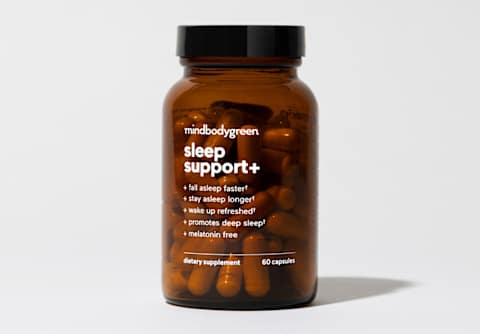Advertisement
Stress Increases During Menopause: 7 Ways To Stay Calm Through It All


An estimated 1.5 million people1 enter the menopause transition each year, yet it's a time of life that isn't talked about nearly enough.
After two decades of helping women around the world through this transition, clinician-informed researcher Lisa J. Taylor-Swanson, Ph.D., MAcOM, LAc,1 has found that there's a huge lack of education about what to expect during this life stage—one that's totally natural and that every person with a uterus will go through eventually. (She recalls working with one woman, from Somalia, who told her that they don't even have a word for menopause in her native language.)
This can cause isolation and uncertainty, which, on top of other common menopausal biological phenomena like hot flashes, night sweats, vaginal dryness, difficulty sleeping, and metabolism changes, can seriously increase feelings of stress and anxiousness. There's also research demonstrating that the hormonal variation during menopause can signal cortisol secretion2, further increasing stress pathways in the body. "And socially, it's such a massive pressure cooker for a lot of women," Taylor-Swanson says on a call to mbg.
All of this to say, menopause and the period leading up to it, perimenopause, can be incredibly stressful. "Happily," Taylor-Swanson adds, "there's a bunch of really good research showing at least moderate help from yoga, acupuncture, herbal medicine, mindfulness-based stress reduction, and cognitive behavioral therapy. Those interventions have all been tested, and certainly, none of them show any kind of harm."
Here's a peek at some of the alternative practices that have been shown to help women ease stress during menopause:
Yoga
A holistic practice that engages the body while focusing the mind, yoga has been found to promote several key aspects of mental well-being3 (anxiousness, stress, sleep) in menopausal women. Poses that support hormone health, like rabbit pose (sasangasana) and cobra pose (bhujangasana) might be especially effective.
Lifestyle shifts
Since perimenopause and menopause come with their own set of unique stressors, Taylor-Swanson says that minimizing other sources of stress in your life during this time as much as possible is key. It's essential to give yourself permission to take a break every once in a while—especially if you're also a caretaker for kids or elderly parents.
Whether it's sticking to stronger boundaries or blocking off moments of self-care on your calendar, any way you can take some more time for yourself is great.
Supplements
For those times when stressors do inevitably come up, arming yourself with a calming supplement can also be helpful for in-the-moment relief.
Sleep
Stress and sleep are forever intertwined. Stress from the day can keep us up at night (as can hot flashes, night sweats, and fluctuating estrogen and progesterone levels!), and missing out on sleep can lead to stress the next day.
For this reason, hormone expert Anna Cabeca, D.O., previously told mbg that we should be prioritizing quality sleep even more than usual during perimenopause and menopause. To do so, she recommends making sure your sleep hygiene is rock-solid (here's a checklist for that) and taking a sleep supplement like magnesium for a little extra support if needed.
Acupuncture and acupressure
Though more research needs to be done on the exact mechanisms, some studies have found that acupuncture can be effective at easing the challenges of menopause4.
Taylor-Swanson believes that this whole-body intervention works so well because it can get to the root cause of tenderness and help soothe multiple parts of the body at once. For those who don't have access to acupuncture, she's also found that just 10 minutes of acupressure a day can help make menopause and its associated stress feel a little more manageable.
Cognitive behavioral therapy (CBT)
A useful practice at any age, CBT was shown to help ease the stress and sleep issues of menopause in a 2019 randomized, controlled trial. Having a therapist with whom you trust to talk about this transition can also ease some of that loneliness and isolation that can come up.
Taylor-Swanson adds that it's also essential to feel supported by your general health practitioner. If you're in the market for a new one, she points to the physicians and nurse practitioners on the NAMS Certified Menopause Practitioners (NCMP) list, who are credentialed to give menopause-related health care.
Diet adjustments
Finally, the gut-brain connection means that a healthy diet can majorly benefit mood during menopause. Since perimenopausal and menopausal women tend to be less sensitive to insulin, you might find that you have trouble optimally processing sugar and refined carbohydrates once you reach this stage.
Instead, nutritionists recommend loading up on healthy proteins, fat, fiber, complex carbs, and omega-3-rich foods to keep your blood sugar balanced and mood steady. The Mediterranean diet, in particular, is thought to help support brain health through menopause and beyond.
The takeaway
Entering a new stage of life is inevitably going to be stressful, but you can approach it with intention and agency. Picking up some new stress-management practices during perimenopause and menopause can help you get back to the millions of other things you have on your plate.
